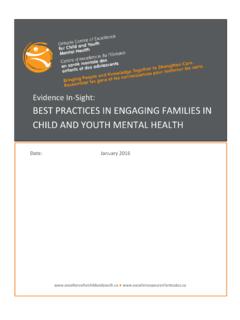Transcription of Principles for Engagement - Mental health, addiction and ...
1 Principles for EngagementPrinciples for Engagement1 The importance of engagementEngagement, also referred to as the therapeutic relationship (or alliance), is the connection assisting therapeutic work between the service user and the worker (Todd, 2010). Engagement is a critical factor in recovery across different cultural and demographic groups, with service users, family/wh nau and workers consistently emphasising its importance. I think if you don t actually engage with a person from the start of the therapeutic process then you re not going to get far. New Zealand sector feedback is also supported by research that has identifi ed Engagement as one of the most important factors contributing to therapeutic effectiveness (Warwar & Greenberg, 2000; Vasquez, 2007).
2 It is critical to get Engagement right at the fi rst point of contact. It is also important to recognise that sound Engagement is a fl uid process that positively infl uences outcomes throughout people s recovery journeys. Engagement is founded on the following main components (Bordin, 1994; Kirsh & Tate, 2006): the connection and rapport between the service user and worker the collaborative nature of the work agreement on goals agreement on tasks. Engagement is also an important component of trauma informed care . A high percentage of people with Mental health , addiction and disability problems have trauma in their lives. The characteristics of a trauma informed care approach include understanding the service user and their symptoms in the context of their life experiences and history, culture and society; genuine collaboration between the worker and the service user at all phases of service delivery and an emphasis on strengths, skill building and acquisition.
3 These practices will be discussed throughout this resource. Let s get real and talking therapiesLet s get real1 is a framework that describes the essential knowledge, skills and attitudes required to deliver effective Mental health and addiction treatment services. Developing positive Engagement is integral to demonstrating the Let s get real Real Skills. This resource has been developed to assist people entering the Mental health and/or addiction workforce to apply the 1 The Let s get real framework can be downloaded from the Ministry of health for Engagement instrumental in demonstrating the Real Skill performance indicators at essential level. More specifi cally, this resource presents practical tips for developing positive Engagement to demonstrate the fi rst two Let s get real Real Skills: Working with services users and Working with families/wh nau.
4 This resource may also be a useful support to undergraduate curricula, to assist in ensuring that people entering the workforce possess basic Engagement skills . Finally, it may serve Principles for EngagementPractical tips for developing positive engagementA resource to support Let s get real Real Skills at essential levelPrinciples for EngagementPrinciples for Engagement2as a useful reminder to practitioners of the importance of Engagement when working with service users and families/wh nau. This resource has drawn from Te Pou s talking therapies2 work to provide practical tips for developing positive Engagement with service users and families/wh nau. Te Pou asked 150 New Zealand practitioners working with diverse population groups: what practices really engage people in therapy?
5 What specifi c practices achieve Engagement with people from different population groups?A series of talking therapies guides were then produced that combined this consultation with national and international research. These guides present effective 2 Talking therapies are based on psychological concepts and theory, and are designed to help people understand and make changes to their thinking, behaviour and relationships in order to relieve distress and support recovery. ways to engage and use talking therapies with M ori, Pasifi ka peoples, older adults, Asian peoples, refugees, asylum seekers and new migrants, and people with problematic substance resource provides a snapshot of the common Engagement Principles to emerge from the suite of talking therapies guides.
6 For specifi c guidance on how to engage with these different population groups, refer to the individual guides (available on the Te Pou website). While these resources can assist in developing knowledge about practices that support positive Engagement , they are not a substitute for training in Engagement skills or cultural competence. 3 The talking therapies suite for working with different population groups can be downloaded from the Te Pou overview of the researchReviews of Mental health research show that Engagement is primarily achieved through developing a strong therapeutic relationship, and predicts positive Mental health outcomes (Horvath & Simons, 1991; Martin, Garske & Davis, 2000). In research looking at the treatment of substance-related problems, an early therapeutic relationship predicts Engagement and retention in alcohol and other drug treatment.
7 The strength of this relationship also predicts early improvements during treatment, but it is unclear whether Engagement predicts post-treatment substance-related outcomes (Meier, Barrowclough & Donmall, 2005).Research is yet to confi rm the factors that cause an effective therapeutic relationship. However, emerging evidence suggests a number of service user and practitioner factors can have an impact on Engagement . Service user factors include: motivation for treatment attendance interpersonal styles confi dence that treatment will be effective (Broome, Simpson & Joe, 1999; Kolden, Howard, Bankoff, Maling & Martinovich, 1997; Ross, Polascheck & Ward, 2008). Practitioner factors include: being able to display a fl exible, honest, respectful, trustworthy, confi dent, warm, interested and open style the ability to employ techniques such as exploration, refl ection, noting past therapeutic success, accurate interpretation, facilitating the expression of emotion, and attending to the service user s experience (Ackerman & Hilsenroth, 2003).
8 Studies by Kirsh and Tate (2006) and Bedi (2006) provide useful frameworks for Engagement , where service users were asked what they thought helped to establish their therapeutic relationship with the practitioner. Principles for EngagementPrinciples for Engagement3 Getting the foundation right: values and attitudesThe right values and attitudes support good Engagement . Without them, practice is likely to be perceived as inauthentic, and rapport and connection with the service user could be compromised. Research has found that a Mental health and addiction worker s attitudes and interpersonal skills predict service users cooperation and involvement in treatment (Crits-Christoph et al., 2009). Clearly service users determine whether a person s intent is genuine before they are ready to receive any offer of service.
9 This service user perspective is summarised well in a resource used during Le Va s essential level Real Skills plus Seitapu training programme: ..they don t care what you know until they know that you care . Pacifi c service user (Le Va, 2010, ).Respect, human rights, service, recovery, communities and relationship are the fundamental values that Let s get real identifi es as critical to ensuring the delivery of effective services. Values that are particularly infl uential in fostering Engagement are outlined : service users are the focus of practice. The values of each service user and of their community are the starting point for all : people working in Mental health and addiction services are committed to delivering an excellent service for all service users.
10 This includes service user partnerships at all levels and phases of service delivery, including the choice of services available and the actual delivery of : positive and authentic relationships are fostered in all spheres of working in Mental health and addiction services can refl ect on their practice to ensure these personal values are demonstrated in their daily work. Attitudes assist in demonstrating these values in practice. The Let s get real framework identifi es that people working in Mental health and addiction treatment services refl ect the following attitudes in their work: compassionate and caring genuine honest non-judgmental open-minded optimistic patient professional resilient supportive supervision4 can assist people to identify ways to refl ect these values and attitudes in their daily work with service users and family/wh nau.









